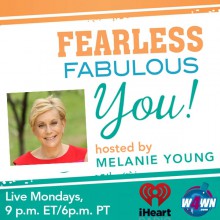This weekfood media celebrity Sandra Leeshared the news thatshe has been diagnosed with breast cancer at the age of 48. When any woman receives the news that she has breast cancer it’s a terrible shock. To share the news and say the words”I have breast cancer” out loud for the first time is incredibly painful. I think everyone chokes. I know I did for months.
Ms Lee’sspecific cancer, DCIS (ductal carcinoma in situ), is relatively common. It’s also considerednoninvasive, and can normally be treated with a lumpectomy followed by radiation. After undergoing alumpectomy, further tests revealed Lee’smargins were not clear which means there was still risk for cancer. Afterconsulting with her breast surgeon, shechose to undergo a bilateral (“double”) mastectomy. Lee said her doctors told her she was “A Ticking Time Bomb.” She stressed the importance of younger women being proactive about their breast health.
I’ve invited my friend, Linda Tantawi, CEO ofKomen Greater NYCto join me on Fearless Fabulous You! Monday, May 18, 9pm ET to discuss ways woman can be proactive about their breast health, explain what more common breast cancer terms, like margins, mean and how to understand your options to make better choices.
Linda has had a long career in not-for-profit and joined Komen NYC in 2013. The New York chapter provides grants for nonprofit organizations that help under served communities in the Tri-State area and will host its annual ImpactAwards Lunch May 20th.
Many people think -erroneously – that breast cancer is an older women’s disease. While, it is true that risk increases with age, a smaller percentage of younger women in their 20s, 30s and 40s are diagnosed. There are many factors to consideraside from age that impact your risk such as genetics, family history, race, ethnicity, breast density and weight, among others.
I believe women should be proactive about their health throughout their life and should know their family history for cancer as well as any genetic diseases. I found my tumor during a monthly breast self-examination nine months after my last mammogram.Women must learn to be comfortable touching their bodies and looking for irregular signs.
Here are my 10 key points action steps to take at an early age to be proactive about your breast health:
- Maintain a healthy body weight. Women who are overweight have a greater risk.
- Stay active. It keeps your weight down and improves overall health
- Eat a healthy plant based diet rich in cruciferous vegetables, nuts, beans and mushrooms. This does not mean you have to give up animal protein entirely unless you want to; just eat more plants and consume less saturated fat (meat/dairy) and more healthy fats (e.g., olive oil and nuts, which are also protein rich). And avoid processed sugar and artificial foods. Get your sugar from fresh fruit.
- Do not smoke and avoid recreational drugs
- Manage your stress and try to maintain a healthy work-personal life balance. I did not do this which I feel led me down the path to my cancer.
- Know your family history for all cancers, not just breast. I had no history of breast cancer; however pancreatic, prostate and skin cancers were on the paternal side of my family. After treatment ended, I underwent genetic testing and found out I was BRCA2 positive. I had further prophylactic surgery to remove my ovaries and Fallopian tubes.
- Ask your doctor if you have dense breasts which have less fatty and more glandular tissue. Dense breasts are common in younger women and women of certain ethnic background. This means tumors may be harder to detect via standard mammograms. Studies have shown that women with dense breasts are six times more likely to have breast cancer. There is a new kind of digital mammogram called tomosynthesis that may help improve detection rates also reduce false positives, another concern with traditional mammograms.
- Consume alcohol in moderation. Sorry gals! I work in the wine and food business. I asked my self more than once: Did my professional contribute to my diagnosis? I still drink wine…in moderation and with food. Check out my blog post this week: https://melanieyoung.com/gone-with-the-wine/
- Many breast cancers can be estrogen receptor positive. You may want to think about the kind of birth control pill you take and for how long. Also consider lowering your intake of soy based foods which are higher in estrogen. Soy is in a lot of packaged foods.
- Be your own health and wellness advocate. Be proactive to prevent. This means not skipping doctors appointments or annual tests and knowing your body and looking for any changes that are unusual. It is never too soon to practice smart breast health.
The info above is covered in my book, Getting Things Off My Chest: A Survivor’s Guide to Staying Fearless & Fabulous, as well asa glossary of frequently used medical terms used during breast cancer diagnosis and treatment. It’s a foreign language that you will need to learn if you are a loved one is ever diagnosed.There is also some great info at theKomen Greater New York website
Connect:
http://twitter.com/KomenGreaterNYC
https://www.facebook.com/komennyc
Join me Mondays, 9pm ET live on W4WN, and anytime on iHeart.com. Download all my podcasts on iHeart.com and the iHeart App (click “Episodes” and scroll to find the show you want to hear. They are filed by guest name). Link:http://www.iheart.com/show/209-Fearless-Fabulous-You
Follow me on Twitter.com/mightymelanieand my Facebook Page: FearlessFabulousMelanie
Join me Sunday, September 13, for Komen NYC Race for the Cure. I’m creating a team starting with all my food and beverage industry gal pals and colleagues and invite you to join us, We won’t stop racing (ahem! walking) until breast cancer is a thing of the past. Want details? Reach me on Facebook. I’ll have a Team address soon,













